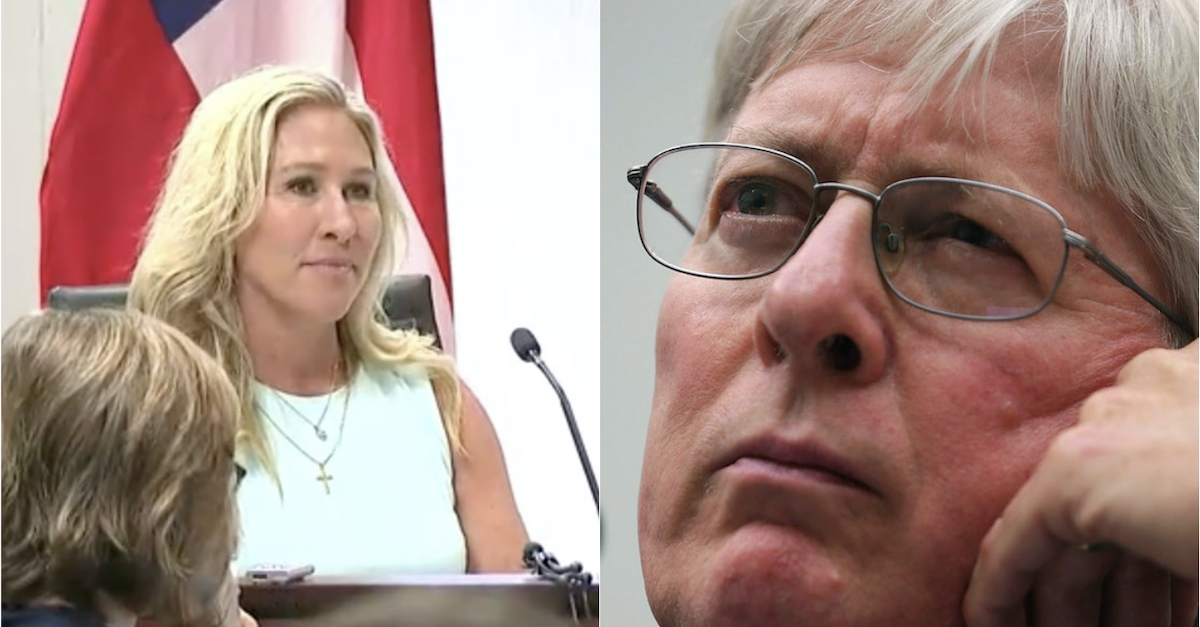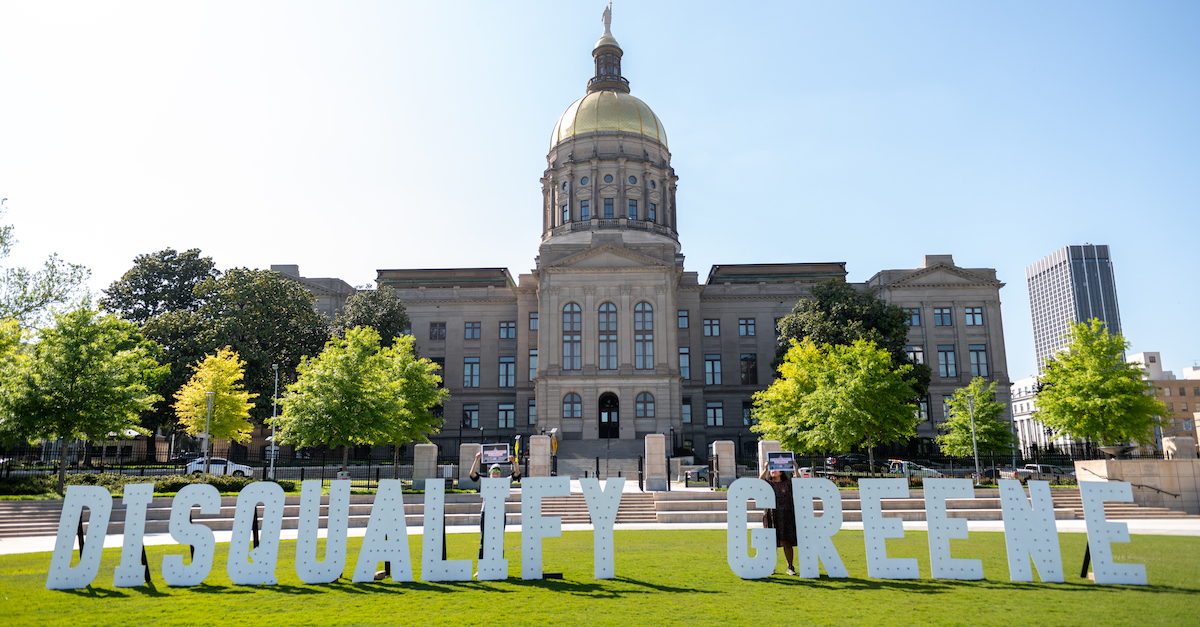
Attorney James Bopp (right) discusses his client Rep. Marjorie Taylor Greene’s testimony on Law&Crime’s podcast “Objections: with Adam Klasfeld.”
Listen to the full episode on Apple, Spotify or wherever else you get your podcasts, and subscribe!
When Rep. Marjorie Taylor Greene (R-Ga.) took to the witness stand in an administrative courtroom in Atlanta, she answered a number of questions mostly related to the Jan. 6 attack on the U.S. Capitol with variations of “I don’t remember” or “I don’t recall”—more than 80 times by her challengers’ count.
Attorneys for Georgia voters seeking to knock her off the ballot under the 14th Amendment’s Section Three disqualification clause characterize her lack of recall as “half-hearted post-hoc attempts to distance herself from the violence” that took place on that day.
Offering a full-throated defense of his client’s sworn testimony on Law&Crime’s podcast “Objections: with Adam Klasfeld,” her attorney James Bopp Jr. calls that nonsense.
“This isn’t a memory test,” Bopp said in a lengthy, rambunctious interview.
“Simply Reporting”
Greene testified for nearly four hours on April 22, where attorney Andrew Celli questioned her on a variety of topics, including her text messages, social media posts, and TV interviews around the time of the Jan. 6 siege.
“She was asked about, you know, text messages from 15 months ago or two years ago,” Bopp said. “I’ve been doing this business for a long time, and people don’t remember inconsequential things, and even some consequential things over time. And she had no way of refreshing her recollection about that because her cell phone is set to delete texts that are more than 30 days old.”
In a memorable exchange at the hearing, Greene also claimed not to remember whether she advocated for martial law.
“Ms. Greene, did you advocate President Trump to impose martial law as a way to remain in power?” Celli asked.
“I don’t recall,” Greene replied.
Days later, Greene’s leaked text messages appeared to show that she at least broached the subject with Mark Meadows, who was the chief of staff of then-departing President Donald Trump.

Ex-White House Chief of Staff Mark Meadows walks along the South Lawn before then-President Donald Trump departs from the White House on Oct. 30, 2020. (Photo by Sarah Silbiger/Getty Images)
“In our private chat with only Members, several are saying the only way to save our Republic is for Trump to call for Marshall [sic] law,” Greene reportedly wrote in the message, dated three days before Joe Biden’s inauguration. “I don’t know on those things. I just wanted you to text him.”
Bopp described the message as Greene “simply reporting on someone else’s conversation,” adding that the congresswoman “specifically disclaimed” advocating for the suspension of civilian government.
In the next line, Greene apparently asked Meadows to text Trump about the subject, and Bopp did not explain why, except to assert that she was simply reporting the matter. Greene’s challengers describe the message as the “last gasp of insurrection,” dated on Jan. 17.
Before that, the challengers note, Greene said: “You can’t allow it to just transfer power peacefully like Joe Biden wants and allow him to become president because he did not win the election.” She referred to Jan. 6 as a “1776 moment,” which the challengers describe as revolutionary rhetoric echoed by extremist groups around that day.
“Speech Is Not ‘Engagement'”
On the podcast, Bopp ridiculed the notion that “1776” was a code word. It’s on the Georgia state seal, he noted. He also argues that the 14th Amendment specifically exempted speech, citing the U.S. Attorney General in 1867.
“Speech is not ‘engagement,'” Bopp said, referring to the constitutional language. “‘Engagement’ is conduct.”
Holding otherwise, he asserted, would have dire consequences for speech and democracy.
“If this ever takes hold, this experiment in representative democracy is over because the voters now have no role in their elections,” Bopp said. “It’s all going to be up to lawyers and bureaucrats and judges, maybe to determine who gets to run for office based upon ridiculous claims like this.”

ATLANTA, GEORGIA – APRIL 21: Georgians spell out “Disqualify Greene” in front of the Georgia State Capitol in support of the challenge to Marjorie Taylor Greene’s qualification for the ballot under the insurrection Clause Of The 14th Amendment on April 21, 2022 in Atlanta, Georgia. (Photo by Derek White/Getty Images for MoveOn)
The challengers disagree, analogizing Greene to Confederate leaders during the Civil War.
“The primary way that leaders engage in insurrection is through their speech—their commands and their advocacy,” their legal brief says. “Under Greene’s theory, the vast majority of Confederate political leaders (including Jefferson Davis) were not disqualified by Section Three—most never fired a shot or gave a speech that met the Brandenburg definition of inciting ‘imminent lawless action.'”
In Bopp’s view, even incitement under the Brandenburg definition would not trigger 14th Amendment disqualification. A longtime attorney for prominent GOP causes, Bopp has a long record of high-profile legal battles involving the First Amendment. Most notably, he spearheaded the Citizens United case that produced the landmark Supreme Court ruling relaxing campaign finance laws.
Bopp was reportedly instrumental in Bush v. Gore, and he defeated an Federal Elections Commission lawsuit accusing the Christian Coalition of illegally campaigning on behalf of candidates like Oliver North, Jesse Helms and Newt Gingrich. He found less success with a spate of lawsuits following the 2020 election, which he quickly withdrew.
“My approach was much, much different than the Trump lawyers, and I think they they did a terrible job,” Bopp said. “My view was, the only way the any judge would or should overturn an election is if there was actual proof and evidence proven before in a trial before a judge with witnesses and legitimate evidence—that only then should a could a judge or should a judge do anything about the results of an election.”
That evidence, he said, just wasn’t there.
Asked whether he accepted Biden as the duly elected president of the United States, Bopp replied without hesitation: “Of course.”
Bopp expressed less certitude as to whether his client, Rep. Greene, acknowledges that.
“I don’t know what she says about that,” he replied.
The previous episode of the “Objections” podcast featured a similarly lengthy interview with Celli, the attorney who grilled Greene.
Listen to the podcast, below:
(Image of MTG via C-Span; Photo of Bopp via Alex Wong/Getty Images)
Have a tip we should know? [email protected]